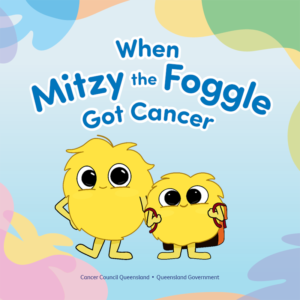
If you are a parent, grandparent, caregiver or health professional, explaining cancer to a young child can feel daunting. When Mitzy the Foggle Got Cancer has been written and designed in collaboration with psychologist Joanna Mangan and identifies the importance of talking to children about cancer in a way that is age appropriate, hopeful, and honest. The story is research-based and crafted to ensure children feel comfortable asking questions and voicing their feelings, while encouraging emotional resilience.
About the story
Meet Mitzy and Squish. They’re a small family of Foggles navigating their way through cancer.
In When Mitzy the Foggle Got Cancer, we learn about Mitzy’s cancer diagnosis. Squish has a lot of questions, and Mitzy reassures Squish that although cancer means some things will have to change, the important things will stay the same. They still love each other, and they’re still a team.
A key theme of When Mitzy the Foggle Got Cancer is that ‘it’s ok to ask questions, and to share your feelings’.
When Mitzy the Foggle Got Cancer is available as both a book and animation. The project was funded by Queensland Health.
You can order the book now for free.
Order your book today
Alternatively watch the animation
Some tips for parents, grandparents, caregivers and health professionals
- First, find out what the child already knows It can be helpful to start by finding out what a child has heard, noticed, or started to imagine about cancer. This gives you a chance to correct any misunderstandings, and address any worries.
- Use real words like “cancer” Clear language can help prevent confusion.
- Be truthful and hopeful Let them know a medical team is working very hard to help the person diagnosed with cancer become strong and well again.
- Encourage questions In the story, Squish has a lot of questions. You could encourage them to ask as many questions as they like, too. Share with the child what you do know, and be honest when you don’t have all the answers.
- Reassure them Let them know they will always be taken care of.
- Make them feel included It can also be a good idea to include children in caring for someone living with cancer in small ways – children can do little things like bringing them a snack, getting them a glass of water, or giving them a blanket, and this helps them to feel like they are helping, too.

